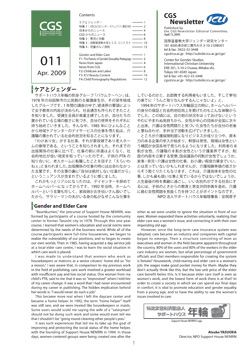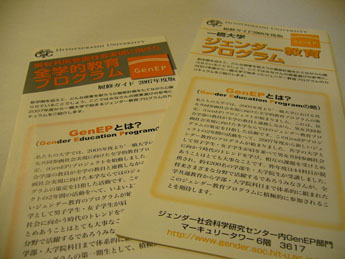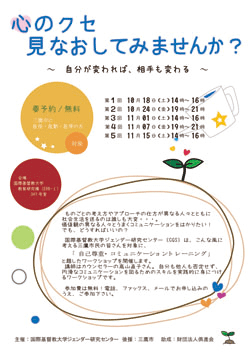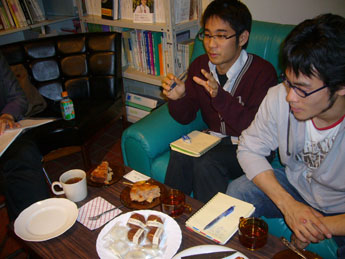In December 2008, at a Christmas party hosted by the Center for Gender Studies, CGS staff asked those who intended to participate in the party dressed in drag to refrain from doing it. Despite our commitment to fighting discrimination against gender minorities and sexual minorities, we at CGS had unwittingly lost sight of our principles and had come to mix up familiarity with easiness to control. We wish to express our sincere regret for the incident last year and we apologize to all those who were victimized and hurt by our actions. CGS regards this incident as a serious issue for our entire organization. We issue this statement to express our firm resolve to prevent such an incident from occurring again in the future and to express our apologies to all those concerned.
May 2009 Archives
CGS Newsletter 011 Available Now!
 The tenth issue of the CGS Newsletter is now available both in print and online. Click the URL to download the PDF version.
The tenth issue of the CGS Newsletter is now available both in print and online. Click the URL to download the PDF version.
Download CGS Newsletter 011
Contents of the CGS Newsletter 010
Atsuko YASUOKA
Director, NPO Support House NENRIN
【The article below is the same as the article that appears in the 11th issue of the CGS Newsletter.】
"Baumkuchen," the precursor of Support House NENRIN, was formed by participants of a course hosted by the community center in former Tanashi city in 1978. Through this one-year course, I learned that women's education and social norms were determined by the needs of the business world. While all of the course participants were full-time housewives, we began to realize the vulnerability of our positions, and so began to create our own worlds. Then in 1985, having acquired a day service job at a local elder care centre, I was to learn the social situation in which care work is placed.
Kimiko KIMOTO
Professor, Hitotsubashi University
Kazuko TANAKA
Professor, International Christian University
【The article below is the same as the article that appears in the 11th issue of the CGS Newsletter.】
CGS: Today, Professors Kimiko Kimoto (KK) and Kazuko Tanaka (KT), shall discuss the future prospects for gender/sexuality pedagogy. Firstly, Professor Kimito could you tell us about Hitotsubashi's GenEP (a school-wide educational program for gender equity)?
KK: At Hitotsubashi University, students follow the curriculum set specifically for their chosen major to complete the credits required for graduation. Before the introduction of GenEP, individual lecturers voluntarily incorporated gender perspectives in their classes since there were no required gender-related courses. But with GenEP, we created for the first time an official system of gender-related courses and offered a list of such courses for students. Every year we make a new program of gender-related coursework that enables students to systematically study gender issues. The program is administered by the Center for Gender Research and Social Sciences (CGraSS).
*CGraSS Website: http://gender.soc.hit-u.ac.jp/index.html
Kazuyoshi KAWASAKA
Graduate student, ICU
【The article below is the same as the article that appears in the 11
th issue of the CGS Newsletter.】
The first conference of the Japan Association for Queer Studies (JAQS), was held at Hiroshima Shudo University on November 8th and 9th, 2008. Despite the last minute notice of absence of one of the symposiasts, the conference was a success with many participants from diverse backgrounds. I was happy with the number of participants, the level of intellectual interaction that took place, as well as the exchange among scholars, students and activists. In this report, however, I would like to put aside the temptation and talk about the problems that were hard to see but surely existed at the conference.
Makiko ISERI
Graduate Student, Hitotsubashi University
【The article below is the same as the article that appears in the 11th issue of the CGS Newsletter.】
The Rainbow March in Sapporo brought together Hokkaido locals and people from all over the country and beyond under a beautiful sunny sky. I went there because I had heard many good things about it and knew that the Tokyo Pride Parade had been postponed this year. And I'm glad I decided to go; the event was full of smiles and energy, and there was no excessive police or public intervention so the whole walk was fun and empowering.
Takako NIWA
Graduate Student, ICU
【The article below is the same as the article that appears in the ???th issue of the CGS Newsletter.】

As a CGS staff member who participated in the CGS-hosted workshop "Developing Self-Esteem and Communication Skills," I would like to report on this event. The workshop series continued over 5 sessions, the titles of which were as follows:
(1) Turn Your Weaknesses into Strengths
(2) Dealing with Stress
(3) Skills in Positive Speaking
(4) Understanding Anger
(5) Dealing with Harassment and Improving Communication Skills at Work
The event drew more applicants than expected, and while this pleased me as a member of the planning committee, it also made me see how so many people were worried about their interpersonal relationships. I felt that the difficulties of living in the contemporary were being pushed under my nose again.
Michiko SAKAI
Undergraduate student, ICU
【The article below is the same as the article that appears in the 11th issue of the CGS Newsletter.】
After giving birth to my daughter in December 2007, I planned to return to ICU in April with the hope of entrusting my child to the proposed ICU childcare center. However, this childcare center was never established, and I was forced to abandon these plans. Critics may say that the idea of going to school while raising a child may have been too hopeful. I feel this myself more than anyone. Nevertheless, I feel overjoyed in being blessed with a daughter. Without question, I believe I made the right choice by giving birth to her.
ICU Graduate
【The article below is the same as the article that appears in the ???th issue of the CGS Newsletter.】
After giving birth in late 2007, I returned to my job eight weeks later for several reasons. Here, I will record my personal opinions and thoughts on labor and childcare.
Ken'ichi ISHIKAWA
ICU graduate
【The article below is the same as the article that appears in the 11th issue of the CGS Newsletter.】
A man who wants to actively take part in child rearing.
A woman who wants to continue working after giving birth.
A company that wants to protect and secure
Shintaro ISHIGURO
Chair, ICU Festival Committee 2008
Keita UEHARA
Committee Planner, ICU Festival Committee 2008
Naoko TAKAYAMA
Counselor, Support House Jomu
Makiko ISERI, Takako NIWA and Naomi SUZUKI
CGS staff members
【The article below is the same as the article that appears in the 11th issue of the CGS Newsletter. The full Japanese version of this discussion can be viewed on here.】

Last year, the ICU Festival 2008 committee had several meetings with CGS staff to discuss whether or not a beauty contest should be held at the ICU festival. Today, Mr. Ishiguro (SI) and Mr. Uehara (KU) of the festival committee met with CGS staff members (Iseri (MI), Niwa (TN) and Suzuki (NS)) for a round-table discussion facilitated by Ms. Takayama (NT) a professional counselor. We hope this article will clarify the issues involved and help you form your own opinions.
Chico Masak
Undergraduate student, ICU
A Homosexual Asian Male Bitch From CA/NZ/JP
【The article below is the same as the article that appears in the 11th issue of the CGS Newsletter.】
At the World Congress III Against Sexual Exploitation of Children and Adolescents on November 24, 2008, an international agreement was reached that all participating countries would undertake to criminalize the possession of child pornography including cartoons (animation, comics, 3DCG, etc.). Many countries prohibit the production and sale of child pornography to protect children from the exploitation and violence considered inherent in non-consensual acts in which, given the adult-child power relation, children inevitably engage as soon as any adult is involved in their sexual activities. This agreement extends the watch on child pornography and makes illegal even the possession of child pornography in cartoon form. They argue that, regardless of whether real children are involved or not, child pornography affects the ways people view children and its prevalence can lead to overtly and excessively sexualized images of children. That is, not only do the children involved suffer physical and psychological harm through non-consensual acts, but also the representation of children in pornography, though indirectly, increases the harm inflicted on real children.
